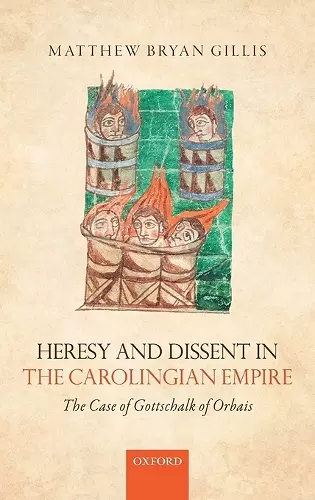Heresy and Dissent in the Carolingian Empire
The Case of Gottschalk of Orbais
Format:Hardback
Publisher:Oxford University Press
Published:16th Feb '17
Currently unavailable, and unfortunately no date known when it will be back

Heresy and Dissent in the Carolingian Empire recounts the history of an exceptional ninth-century religious outlaw, Gottschalk of Orbais. Frankish Christianity required obedience to ecclesiastical superiors, voluntary participation in reform, and the belief that salvation was possible for all baptized believers. Yet Gottschalk-a mere priest-developed a controversial, Augustinian-based theology of predestination, claiming that only divine election through grace enabled eternal life. Gottschalk preached to Christians within the Frankish empire-including bishops-and non-Christians beyond its borders, scandalously demanding they confess his doctrine or be revealed as wicked reprobates. Even after his condemnations for heresy in the late 840s, Gottschalk continued his activities from prison thanks to monks who smuggled his pamphlets to a subterranean community of supporters. This study reconstructs the career of the Carolingian Empire's foremost religious dissenter in order to imagine that empire from the perspective of someone who worked to subvert its most fundamental beliefs. Examining the surviving evidence (including his own writings), Matthew Gillis analyzes Gottschalk's literary and spiritual self-representations, his modes of argument, his prophetic claims to martyrdom and miraculous powers, and his shocking defiance to bishops as strategies for influencing contemporaries in changing political circumstances. In the larger history of medieval heresy and dissent, Gottschalk's case reveals how the Carolingian Empire preserved order within the church through coercive reform. The hierarchy compelled Christians to accept correction of perceived sins and errors, while punishing as sources of spiritual corruption those rare dissenters who resisted its authority.
Gillis excels at unpacking and weaving a wide variety of sources, hymns, letters, poems, exegetical texts, sermons, and even the Heliand, into a coherent narrative that deftly combines elements of personal history, theology, and questions of authority in the Carolingian world. * John J. Contreni, Early Medieval Europe *
Gillis' effort is a welcome addition to expanding scholarly understanding of the early medieval world...Gillis' book paints an effective and vivid portrait of the complicated, heated, and coercive aspects of the Carolingian Renewal. * Owen M. Phelan, Mount Saint Mary's University, Catholic Historical Review *
Gillis has produced an impressive and nuanced study. He has taken care to explore Gottschalk's experiences and ideas in the round, and to engage with his varied output that ranged from theological treatises to poems and hymns. * JAMES T. PALMER, University of St. Andrews, AMERICAN HISTORICAL REVIEW *
The image of Gottschalk of Orbais as the fanatical thinker of one idea, who was harshly condemned and then nursed his resentment over a lifetime, is not far from the truth, as we learn from this finely researched and crisply written book. * Michael E. Moore, University of Iowa, Speculum *
Gillis presents an interesting, important, and largely original book. * Thomas F. X. Noble, The Medieval Review *
Heresy and Dissent in the Carolingian Empire is successful at portraying the career of a rogue 9th-century theologian. Although Gottshalk's case is exceptional, it illustrates in vivid and compelling ways the means by which one stubborn thinker could challenge church authorities about fundamental Christian doctrines, even from prison... Gottshalk's imprisonment in Hautvillers provides an excellent example of the networks of information exchange that made the walls of early medieval cloisters much more porous than they usually seem. Historians of early medieval religion will find much to ponder in Gottshalk's notorious career, which Gillis has presented with admirable erudition and attention to detail. * Scott G. Bruce, Reading Religion *
Gillis's excellent book brings the life and ideas of this entrancing early medieval heretic to the attention of a new generation of scholars. * Charles West, Journal of Ecclesiastical History *
This is an important study that scholars of the Carolingian world and of early-medieval religious culture in general will read and use for many years to come. It is a book we should be grateful to have. * Dr Scott Ashley, Reviews in History *
This could be simply a story about the power of Carolingian bishops in suppressing dissenting voices, yet Gillis is able to demonstrate that Gottschalk had considerable agency. * Rob Meens, History *
ISBN: 9780198797586
Dimensions: 241mm x 160mm x 24mm
Weight: 544g
288 pages